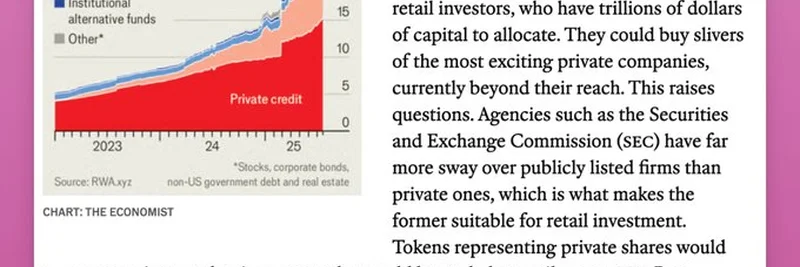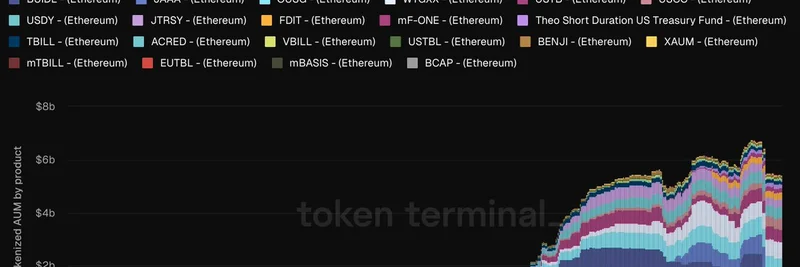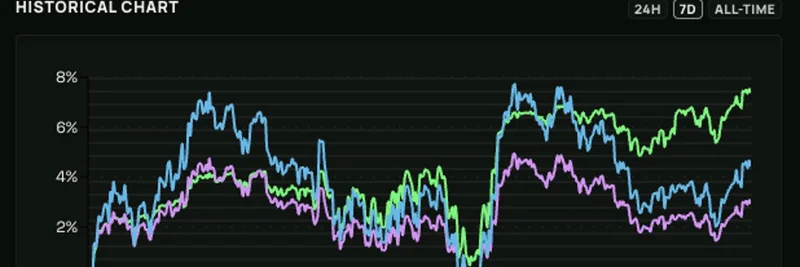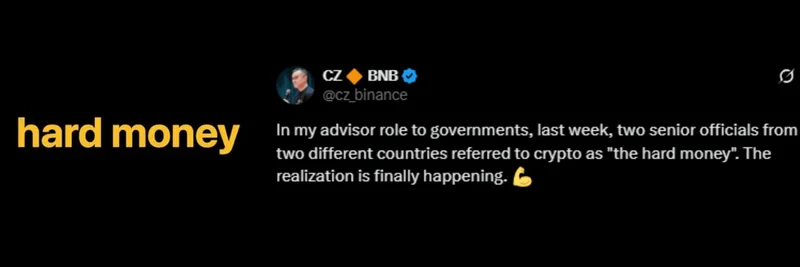Hey there, crypto enthusiasts and blockchain buffs! If you’ve been keeping an eye on the latest trends in the world of decentralized finance (DeFi), you’ve probably noticed a buzz around tokenization. A recent tweet from Ignas | DeFi caught our attention, and it’s all about how this game-changing technology is turning private companies into something resembling public entities. Let’s dive into the details and explore what this means for the future of finance.
The Tweet That Sparked the Conversation
Ignas shared an insightful take based on a The Economist article, highlighting a chart that tracks the global value of tokenized real-world assets (RWAs). The tweet quotes, “At a large enough scale, tokens would in effect turn private firms into public ones,” and celebrates this as a win for the crypto community. Attached to the post is a striking image from The Economist, which we’ll break down below.
This chart shows the explosive growth of tokenized assets, with private credit leading the charge. From 2023 to 2025, the value has skyrocketed, hinting at a seismic shift in how we view ownership and investment.
What Is Tokenization, Anyway?
For those new to the term, tokenization is the process of converting real-world assets—like stocks, real estate, or even private company shares—into digital tokens on a blockchain. Think of it like turning a physical gold bar into a digital voucher you can trade instantly. This technology, powered by blockchain, makes it easier to buy, sell, and trade assets that were once locked away in private markets.
The Economist points out that this opens the door for retail investors—who collectively hold trillions of dollars—to invest in exciting private companies they couldn’t access before. It’s like getting a backstage pass to the hottest startups without needing a VIP connection!
Turning Private into Public: The Big Idea
Here’s where it gets really interesting. The article suggests that tokenizing private shares could make them as easy to trade as an Exchange-Traded Fund (ETF). Unlike ETFs, where issuers promise to provide liquidity by buying and selling underlying assets, tokenized assets don’t come with the same guarantees. However, at a large scale, this could blur the lines between private and public companies.
Imagine a private firm like a tech unicorn issuing tokens representing ownership. Suddenly, millions of people can buy small slices of that company, much like they would with publicly traded stocks. The catch? These firms wouldn’t need to meet the strict disclosure requirements that public companies face, thanks to the Securities and Exchange Commission (SEC) and similar regulators. It’s a bold new world where privacy meets accessibility.
Why This Matters for Blockchain Practitioners
For those of us in the blockchain space, this is a huge deal. The tweet’s claim that “the view that crypto has not produced any innovations of note can be consigned to the past” resonates deeply. Tokenization isn’t just about hype or meme coins—it’s about redefining capital markets. As Ignas and others in the thread suggest, this could push venture capitalists (VCs) and founders to rethink cap tables early on and even lead to the first major private company tokenizing its equity on-chain.
The conversation in the thread also hints at a “financial stack rewiring itself in real time.” That’s a powerful way to describe how blockchain is dismantling old barriers and creating more open, transparent markets. Whether you’re a DeFi developer or a meme token enthusiast, understanding this shift is key to staying ahead.
The Road Ahead
Of course, this isn’t without challenges. Regulators are already grappling with how to oversee this “wild west” of innovation, as Danielle Fong notes in a related thread. Liquidity crises could loom on the horizon, but the potential rewards—democratizing investment and boosting liquidity—seem worth the risk.
As we move into 2025, keep an eye on how tokenization evolves. Will we see the first major tokenized private company debut? Could this lead to a new era of meme-inspired tokenized assets on platforms like meme-insider.com? One thing’s for sure: the blockchain community is winning, and the future of finance is looking more decentralized than ever.
What do you think about this shift? Drop your thoughts in the comments, and let’s keep the conversation going!




